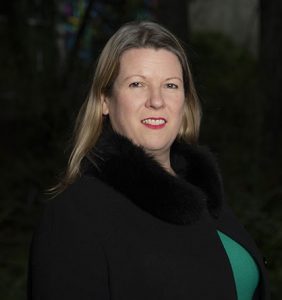Biography
For over 20 years, Miranda Huron, a member of the Mattawa North Bay Algonquins, has worked in Indigenous education with a specialization in language revitalization. Miranda is the Director of Indigenous Education and Affairs at Capilano University in North Vancouver. She came to this role fresh from her time as the Director of Indigenous Languages and Affairs at the Assembly of First Nations, where she led the team representing First Nations’ interests in the co-development and negotiation of the Indigenous Languages Act, which received Royal Assent under her tenure on June 21, 2019. Miranda received both her BA and her MEd at UBC and is currently working on her UBC doctoral research exploring the concept policy of co-development and its relation to self-determination.
Miranda has sat on the Premier’s Advisory Committee on Aboriginal Training, the UBC Vice-President’s Strategic Implementation Committee for Equity and Diversity, the UBC Senate (past), and the Capilano University Senate (current). She is currently a board member of the UBC Alumni Board and sits on committees with the City of New Westminster.
In her spare time, Miranda has been known to cycle across continents. To date, she has cycled across Canada and Russia solo, and from Cairo to Cape Town with a group.
Meeting Miranda
What is your most memorable experience from your time in the Faculty of Education?
Dr. Cash Ahenakew developed a course to reframe our concept of education. It involved going to Sundance. I’m not from a Nation that practices Sundance, but I’m also far away from my home territory, so the opportunity to take part in the ceremony was a real gift. The greatest moment for me, aside from getting to know my cohort incredibly well, was getting to go into the fields and harvest sage for the ceremonies, and being amazed by the countless types of grasshoppers flying from blade of grass to blade of grass.
Where has your education from the Faculty of Education taken you in your career?
Focusing on education policy allowed me to extend my skills from my previous Linguistics degree so that I was then able to be selected as the Director, Languages and Culture for the Assembly of First Nations. I was part of the co-development table for the Indigenous Languages Act, representing First Nations interests. Doing this work has defined my existence.
Where do issues of inclusion find a place in your life or at work?
Inclusion is a constant in my life and work. I have always worked in the service of others, from areas of student success to running scholarship programs, to advocating for Indigenous rights. My goal is to lift up the generations that follow me and to respect the work of the generations that came before me.
Do you have any words of wisdom for current students? Newly graduated folks?
For current students, make the most of your student life. I found myself in clubs like the sailing club and the varsity outdoors club. I still have life-long friends from there. Look out for every opportunity, every chance to travel, every research question you can be involved in, and have your voice heard where ever you can – this is the time when people will listen to you the most. For newly graduated people, I’m not going to say it’s easy, but I actually got to work in the field of Linguistics – an area that I heard over and over was a useless degree. There is no such thing as a useless degree. Your education will always find a use, even it doesn’t come easily.
